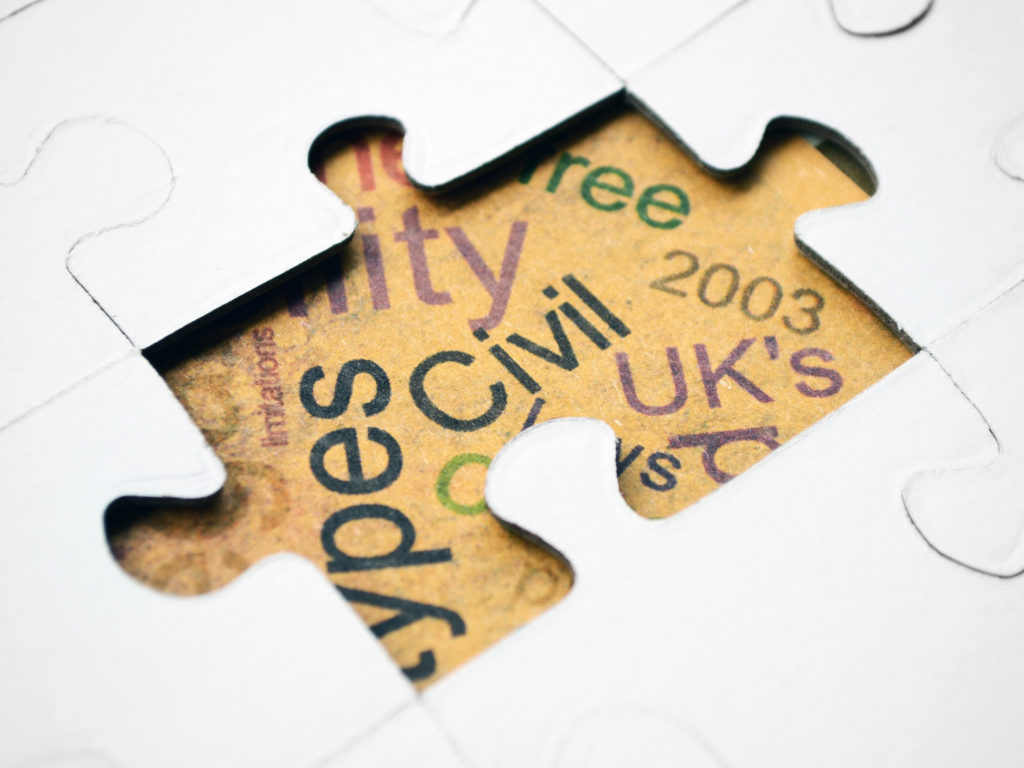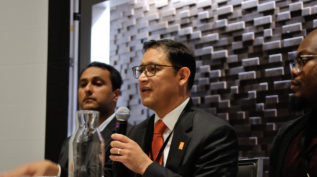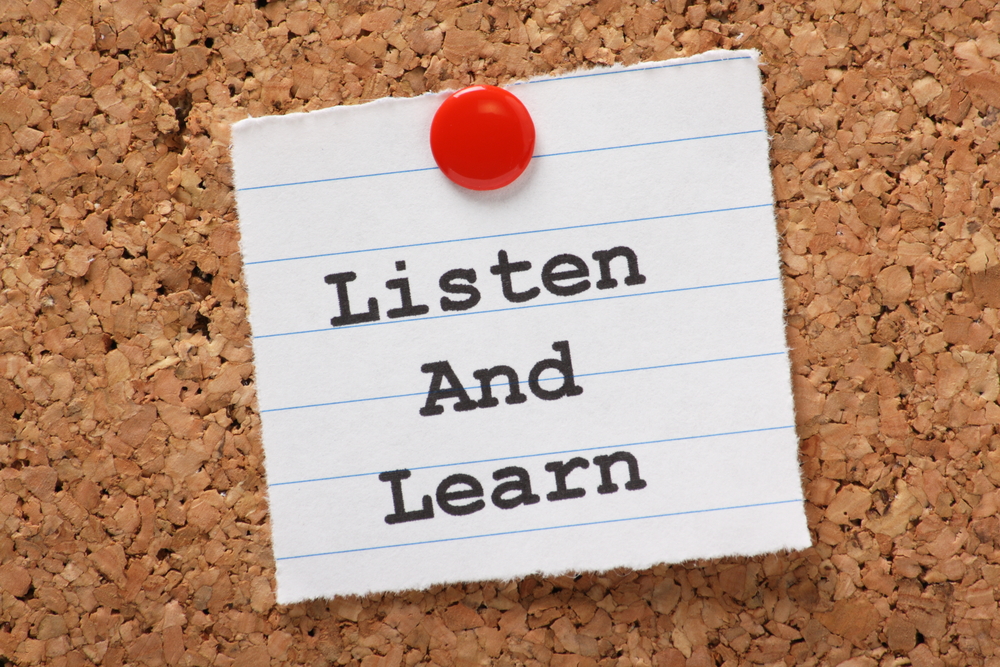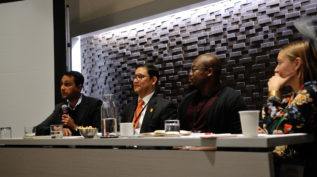It’s Cool to be Kind: How to Have Civil Conversations in Today’s World

Civil: relating to ordinary citizens and their concerns; courteous, polite
—Merriam Webster
In an increasingly divisive society—where politics seem to dominate public as well as private discourse—what would it be like to hold civil conversations in our own families and communities? And how might family foundations create space for people to come together and have these conversations?
These were big questions the panelists addressed in a session called Civil Conversations, Civic Engagement, and Participatory Democracy at the 2019 National Forum on Family Philanthropy.

What exactly is a civil conversation, you ask? (An apt question, as you picture a dozen of your extended family members soon sitting around the same holiday dinner table.)
At its simplest, a civil conversation is a dialogue between two people or a group that intends to build a better understanding. Participants don’t have to agree—what matters is the act of listening to other people and learning their perspective. In that way, a civil conversation focuses on process rather than results. That means the conversation won’t necessarily reach a pat resolution or an answer. The point is to raise important questions and (hopefully) hear one another’s point of view.
Civil conversations have one intention: to build a better understanding. That doesn’t mean there is always an answer or a solution. It’s about raising questions and hearing one another’s point of view.
What’s the best way to start a civil conversation? Simply show up as ourselves, said panelists. Now that may sound simple, but how often do we show up in this world as anything but our authentic selves? We wear our professional roles, our skin color and economic status, our concerns, our fears, our family histories. Yet if we can show up and speak our truth, messy as it is at times, we are more likely to see similarities in ourselves and others.

Ricardo Estrada at the 2019 National Forum.
“The shortest distance between two humans is a story,” said Ric Estrada, board chair of the Woods Fund and president and CEO of Metropolitan Family Services, one of Illinois’ largest human service agencies. “It’s when we listen and hear each other’s stories that we recognize common experiences. And on those commonalities, we can build communities.”
Estrada admitted that family conversations are some of the hardest to have. They are conversations that can trigger a deeper emotional charge, as family members sometimes play out patterns of the past.
“It’s much easier to engage in civil conversation with a group of people you don’t know than it is the people you know the most,” said Estrada. “Yet family members, in some cases, are the people with whom we can be most authentic, and with whom we can go out on a limb. If you disagree, family will forgive you—in most cases.”
What works well in any conversation, he said, is when we listen to understand, rather than listen to respond or be right. “There’s a peacebuilding in that kind of listening,” he said. “Although you may say the word peacebuilding to a family member, and he or she will roll their eyes. Still, it’s a conversation worth having.”
An Opportunity… and a Precious Gift

Families have an unbelievable opportunity to have and hold these listening conversations, and to look at what’s working and what’s not, said Dr. Stephen Treat, CEO Emeritus of the Council for Relationships, in the session Avoiding Avoidance at the 2019 National Forum on Family Philanthropy.
“How many of us sit down for two hours and talk about family process?” said Dr. Treat. “How many family members ask each other: how are we relating? Are people feeling included, heard, hurt? Are we managing our conflict, or is our conflict creating the vision?”
Dr. Treat, a senior marriage and family therapist, said he comes from a failed family business, where uncivil conversations lasted two or three generations. “Most people never talk about what bugs them. They hold it in and hope it goes away. But it never does; it builds. If people aren’t disciplined in how they speak to each other, it can divide a family and a foundation.”
“Can you process your life and relationships out loud?” he asked session participants. “If family leaders can model these conversations for their kids, that’s a precious gift.”
When engaging with family members or others with whom you disagree, panelists said it’s important to set expectations about what you want to accomplish from the conversation. Ask yourselves: Why are we engaging in this conversation? How is cooperation worth it? Knowing your “why” provides the incentive to stay in the conversation, even when it gets difficult.
Eboo Patel, founder and president of Interfaith Youth Core, said he sees disagreements as a sacred part of life. “We are part of the American project—a project that brought together a diverse group of people to the same patch of land, despite their differences, under the premise that it can work.”

Eboo Patel, Ricardo Estrada, Lucas Johnson, and Jessica Swoyer Green at the 2019 National Forum.
He asked: “How do we do the sacred project of building community of deep difference, unless you are willing to disagree on some of the fundamental things, and agree to work on the others?”
“It’s okay to hold divergent views, but let’s not lose sight of the importance of underlying community,” said Patel. “I might be part of a particular group or community with views I seek to advance, but underneath it all, I uphold a political community that unites us all. Holding this community at the core is essential to our democracy.”
Patel shared the following advice: “If you are engaged in social change, you are principally engaged in the art of persuasion. In civil conversations, if you can convince the people with whom you disagree that the world you are building is a place where they will thrive too, they will be much more likely to agree with you.”
Lucas Johnson, executive director of On Being – Civil Conversations Project, said despite the disinformation and discord in today’s world, he sees hopefulness in this moment. “People realize we need to recover a way to engage people across the differences in our lives, and are looking for more ways to convene across topics and geographies.”
Family foundations have an opportunity to lead this charge, convene communities, and create the space for thoughtful conversations and civic engagement. It’s often a low-cost and high-impact way to show leadership—and learn.
This holiday season, ask yourself and your family and board: How can we hold, host, and inspire the conversations we want to be hearing?
Here are some resources on having/convening civil conversations:
NCFP Content Collection on Avoiding Avoidance
On Being – Civil Conversations Project – Better Conversations Guide
Courageous Conversations about Race
Civil Conversations in Uncivil Times: Family Philanthropy Webinars: NCFP Knowledge Center
PACE Primers: Philanthropy for Active Civic Engagement
Ted Talks: 10 Ways to Have a Better Conversation with Celeste Headlee
